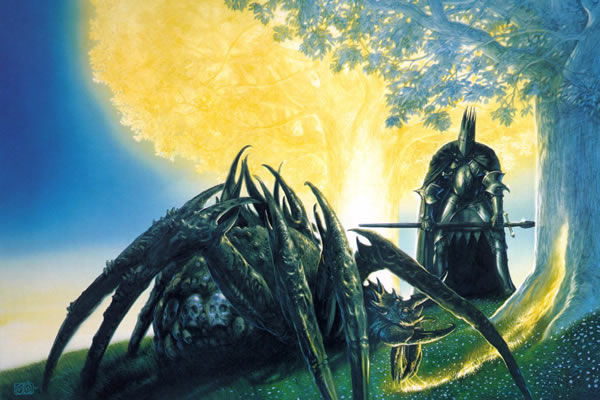Ned Flanders said:
Another thing I could never understand was how Frodo's accomplishment was so noble given that a) Sam basically willed him to the top of Mount Doom, and that b) the ring was destroyed by mere happenstance. When Sam carried the ring for Frodo it seemed almost inconsequential (until Frodo demanded he hand it over)...he kicked ass and took names, never wrestling with the temptation in the least (and certainly not at all to the degree of Frodo, Gollum, or Boromir). Then on top of that, Frodo put the ring back on, began languishing again, and then Sam practically dragged his ass to the volcano's cauldron. And at the end, the ring's destruction was no triumph of will or duty, but a mere side effect of the greed it engendered. I guess it's cool that the lust for the ring's power eventually led to it's own undoing, but it just really seemed to diminish the fact that they (Frodo in particular) had done their duty. I guess the movie was just mirroring the source material, but it doesn't make it any more palatble to me as a movie-goer.
I'd like to respond to this, a bit. I'll provide you with some details and insight that really could only have come from reading the books.
Frodo was Bearer of the Ring for quite a few years, actually, IIRC. I don't remember what the span of time was between Bilbo leaving the Shire and Frodo & co. following his footsteps, but I'm pretty sure it was at least 4 years, possibly more. That may not seem like such a span of time but added to however many years that was, Frodo also physically bore the Ring for a whole 13 months. Over a year of near-constant contact. The Ring corrupts any near it, especially its Bearers. Now, one thing the movies don't outright explain, is that Hobbits seem to have a very unusual trait, that being a potent resistance to corruption. Smeagol and Deagol weren't Hobbits, exactly, they were likened to the predecessors of the "present" day Hobbits, sharing many similar traits and customs with those that would follow. Smeagol Bore the ring for centuries, IIRC. It obviously lengthened his lifespan and corrupted him fully, but to his credit, he wanted it only for himself, not to fulfill dreams of power and conquest.
Bilbo, an even stronger case, was Bearer for a few decades (I want to say at least 50 or 60 years, but again, I don't recall fully), and while you could see evidence of corruption in him, he too never sought to use the Ring to dominate others. As I mentioned before, Frodo bore it for only about 5 or 6 years, at most, and he did succumb at the very end. But another thing to consider is that before Sauron's self proclamation (his arising took decades, if not longer) the Ring was content to remain with Smeagol and later Bilbo, in a relatively dormant state. It was only once Sauron unveiled himself to his enemies (and allies) that the Ring awakened and began to actively influence events (in order to reunite itself with its true master.) As Sauron gained in power, so to did the Ring, and as the Ring strengthened, so would its Bearer weaken.
Frodo and Sam's triumph wasn't so much that they destroyed the Ring, but that they were able to remain true to themselves for the 13 or so month journey to and through Mordor. And realize, the closer the Ring got to Mordor, and then Sauron, the greater the influence it could exert over Frodo. Each step Frodo took would have made the burden that must harder to bear. The reason that Sam seemed less affected by the Ring is that (1) he is indeed a heartier Hobbit than Frodo (who was further diminished by the evil of the Witchking's strike at Weathertop), and (2) he (Sam) only actually Bore the Ring for a couple of days, not the years Frodo did.
Frodo was, for all intents and purposes, a pretty shattered soul by the time he reached Mt. Doom, and it is unsurprising that he eventually succumbed, just as Isildur did. However, he resisted the Ring MUCH longer than Isildur. In fact, though I don't think it's expressly mentioned in the books, I do believe it is implied that Man are the weakest in resisting its affects (supported by Boromir's quick fall to the Ring, despite the fact that he never came to bear it.)
It is highly unlikely that any other race would have succeeded where Frodo and Sam did. Gandalf and all of the other Elves wouldn't even TOUCH the Ring.
Edit - A few more thoughts.
You may have noticed that not only the Elves (and Gandalf, who isn't actually of the race of Man, in case you didn't know) left Middle Earth forever, for the Grey Havens, but so to did all of the Bearers. Frodo, in particular, was too warped by the influence of the Ring to ever be happy again in Middle Earth. He leaves Bag End to Sam, and departs Middle Earth. What the movies do not tell you, however, is that after Sam inherits Bag End, marries Rosie, becomes Sheriff of the Shire, and has oodles of kids, a darkness grips him too. IIRC, many, many years (decades) after the movie ends, Sam too eventually leaves Middle Earth for the Havens.
It's actually pretty remarkable, then, that where Elves and Wizards dare not touch the Ring, and where Men are almost instantly consumed by it, the diminutive, relatively non-important Hobbits are best equipped to handle it...













